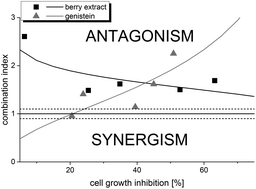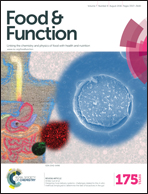Bilberry extract, its major polyphenolic compounds, and the soy isoflavone genistein antagonize the cytostatic drug erlotinib in human epithelial cells
Abstract
Erlotinib (Tarceva®) is a chemotherapeutic drug approved for the treatment of pancreatic cancer and non-small cell lung cancer. Its primary mode of action is the inhibition of the epidermal growth factor receptor (EGFR), a receptor tyrosine kinase (RTK). Recently, RTK-inhibiting polyphenols have been reported to interact synergistically with erlotinib. Furthermore some anthocyanidins and anthocyanin-rich berry extracts have been reported to inhibit tyrosine kinases, including the EGFR, which raises the question of potential interactions with erlotinib. Polyphenol-rich preparations such as berry- or soy-based products are commercially available as food supplements. In the present study we tested a bilberry extract, its major anthocyanin and potential intestinal degradation products, as well as genistein, with respect to possible interactions with erlotinib. Cell growth inhibition was assessed using the sulforhodamine B assay, while interactions with EGFR phosphorylation were analyzed by SDS-PAGE/western blotting with subsequent immunodetection. Genistein, bilberry extract, delphinidin-3-O-glucoside and delphinidin were found to antagonize erlotinib whereas phloroglucinol aldehyde was found to enhance cytostatic effects of the drug on human epithelial A431 cells. Genistein also antagonized the EGFR inhibitory effects of erlotinib, whereas bilberry anthocyanins showed no significant interactions in this regard. Our data indicate that different polyphenols are potentially able to impair the cytostatic effect of erlotinib in vitro. Genistein interacts via the modulation of erlotinib-mediated EGFR inhibition whereas bilberry anthocyanins modulated the growth-inhibitory effect of erlotinib without affecting EGFR phosphorylation, thus indicating a different mechanism of interference.


 Please wait while we load your content...
Please wait while we load your content...